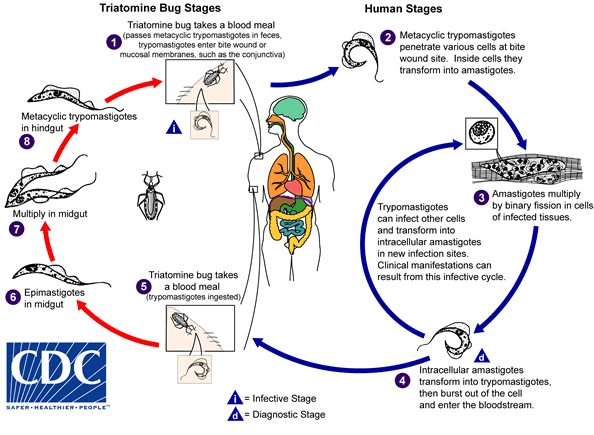Identification of a Triatoma sanguisuga “Kissing Bug” — Delaware, 2018
April 25th, 2019Eggers P, Offutt-Powell TN, Lopez K, Montgomery SP, Lawrence GG. Notes from the Field: Identification of a Triatoma sanguisuga “Kissing Bug” — Delaware, 2018. MMWR Morb Mortal Wkly Rep 2019;68:359. DOI: http://dx.doi.org/10.15585/mmwr.mm6815a5External.
“……Subsequently, the insect was sent to CDC, where species-level identification was morphologically confirmed. Conventional polymerase chain reaction testing of the triatomine hindgut was negative for T. cruzi. Bloodmeal analysis detected a human bloodmeal; the girl who was bitten had no ill effects.

This finding represents the first confirmed identification of T. sanguisuga in Delaware…..
Chagas disease can cause serious cardiac and gastrointestinal complications. CDC estimates that approximately 300,000 persons with Chagas disease live in the United States, and most were infected with T. cruzi in the parts of Latin America where Chagas disease is found. Triatomine bugs also are found in the United States, but only a few cases of Chagas disease from contact with the bugs have been documented in this country (2). Although presence of the vector has been confirmed in Delaware, there is no current evidence of T. cruzi in the state (2). T. cruzi is a zoonotic parasite that infects many mammal species and is found throughout the southern half of the United States (2). Even where T. cruzi is circulating, not all triatomine bugs are infected with the parasite. The likelihood of human T. cruzi infection from contact with a triatomine bug in the United States is low, even when the bug is infected (2).
Precautions to prevent house triatomine bug infestation include locating outdoor lights away from dwellings such as homes, dog kennels, and chicken coops and turning off lights that are not in use. Home owners should also remove trash, wood, and rock piles from around the home and clear out any bird and animal nests from around the home. Cracks and gaps around windows, air conditioners, walls, roofs, doors, and crawl spaces into the house should be inspected and sealed. Chimney flues should be tightly closed when not in use and screens should be used on all doors and windows. Ideally, pets should sleep indoors, especially at night, and outdoor pet resting areas kept clean. Finally, homeowners might consider using a licensed pest control professional for insect control (1,2)……”

An infected triatomine insect vector (or “kissing bug”) takes a blood meal and releases trypomastigotes in its feces near the site of the bite wound. Trypomastigotes enter the host through the wound or through intact mucosal membranes, such as the conjunctiva  . Common triatomine vector species for trypanosomiasis belong to the genera Triatoma, Rhodnius, and Panstrongylus. Inside the host, the trypomastigotes invade cells near the site of inoculation, where they differentiate into intracellular amastigotes
. Common triatomine vector species for trypanosomiasis belong to the genera Triatoma, Rhodnius, and Panstrongylus. Inside the host, the trypomastigotes invade cells near the site of inoculation, where they differentiate into intracellular amastigotes  . The amastigotes multiply by binary fission
. The amastigotes multiply by binary fission  and differentiate into trypomastigotes, and then are released into the circulation as bloodstream trypomastigotes
and differentiate into trypomastigotes, and then are released into the circulation as bloodstream trypomastigotes  . Trypomastigotes infect cells from a variety of tissues and transform into intracellular amastigotes in new infection sites. Clinical manifestations can result from this infective cycle. The bloodstream trypomastigotes do not replicate (different from the African trypanosomes). Replication resumes only when the parasites enter another cell or are ingested by another vector. The “kissing bug” becomes infected by feeding on human or animal blood that contains circulating parasites
. Trypomastigotes infect cells from a variety of tissues and transform into intracellular amastigotes in new infection sites. Clinical manifestations can result from this infective cycle. The bloodstream trypomastigotes do not replicate (different from the African trypanosomes). Replication resumes only when the parasites enter another cell or are ingested by another vector. The “kissing bug” becomes infected by feeding on human or animal blood that contains circulating parasites  . The ingested trypomastigotes transform into epimastigotes in the vector’s midgut
. The ingested trypomastigotes transform into epimastigotes in the vector’s midgut  . The parasites multiply and differentiate in the midgut
. The parasites multiply and differentiate in the midgut  and differentiate into infective metacyclic trypomastigotes in the hindgut
and differentiate into infective metacyclic trypomastigotes in the hindgut  .
.
Trypanosoma cruzi can also be transmitted through blood transfusions, organ transplantation, transplacentally (from mother to unborn baby), and in laboratory accidents.

